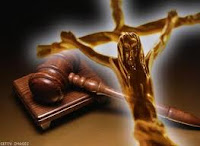I get asked a lot of questions once people realize I am a lawyer. Once I talk about my faith, the questions multiply. How can you defend guilty people? How do you deal with having to lie all the time? What about all the victims your clients have hurt? Really, how can you defend guilty people?
Do you believe that right answers can be found in law?
 The law is a human construct, a very useful
The law is a human construct, a very useful one, but a human construct none the less.
So, though the ideal is justice, for the
most part what we get is a workable
system.
and the moment you waited for.....
This question is so irrelevant when you're actually within the
criminal justice system. That's not the point of a good defense.
As a defense lawyer it is not my job to "get my client off". My
job is to present the facts given in the light most favorable to
my client so that a discerning jury or judge can determine whether
they feel, based on that evidence, my client is guilty or not.
I'm not the judge or jury, so my client's guilt means very little to me.
(The only time it even comes up is when I'm telling a jury/judge
to find my client not guilty or when I'm advising the client of how the evidence looks.)
It's a flawed system in which people have to some extent arbitrarily
defined things we'll count as crimes and what the punishment will be
for such things. The most you can do is work within the
system we have now and trust that your personal God takes care of
the situations our limited system cannot address. So, wow...there seems to be a bit of responsibility shirking in my last answer. But, here goes--a nutshell explanation of why I do what I do. People do bad things, very bad things to each other. That said, even bad people deserve a fair trial. I'm more than willing to be the person who helps provides that.
What I think God wants from lawyers...
In Luke 11:46-52 Jesus speaks directly to lawyers, administering criticism. At that time the definition of a lawyer was likely different. Because the Torah was the law, a lawyer was most likely someone who studied the Torah and, as a result, had a deep knowledge of the law. So, within this Biblical context, a lawyer was seen as an expert on God's Word. Yet, Christ's comments to them are not at all congratulatory, "Woe unto you also, ye lawyers!" Christ says, "For ye lade men with burdens grievous to be borne, and ye yourselves touch not the burdens with one of your fingers." (Luke 11:46, KJV)
These passages apply to lawyers today, though lawyers have taken a different role in society. The law today is still a form of access. Our society has various levels from and into which people are restricted or admitted based on their understanding of the language of law. For example, property ownership is governed by the law. The more law you know, the better your chances of acquiring better property in exchange for less resources. And, ultimately, the more law you know, the better your chances are of retaining this property and passing the property on to assigns of your choosing. Lawyers are key to this exclusive legal system-- over time lawyers have established and maintained a system which limits non lawyers' access to the law. As a result, we have a monopoly on the law. This system is analogous to the old 'legal' system of which Jesus speaks. Jesus' statement "Woe unto you lawyers! For ye have taken away the key of knowledge," (Luke 11:52 a, KJV) rings especially true in light of this legal alienation lawyers have set up.
Thus, in this type of system, the responsibility of lawyers seeking to submit to God's will is to ensure that we're not burdening others with our superior knowledge of the law. That means, we have to be using this knowledge, this access, to create access for others. Lawyers have to use the immense power we have been given with restraint--with the understanding that we hold that power as stewards of the Most High. As people depend on us to lead them through the legal system for necessities such as freedom from unfair incarceration, the means to raise and protect their families, and the ability to freely express themselves through their religion and other speech, we have to make sure we are not blocking the door. From the moment we take on a client, we have taken on the responsibility to faithfully lead them, the charge God has given us, through the jungle of the legal system.
Thoughts?

No comments:
Post a Comment